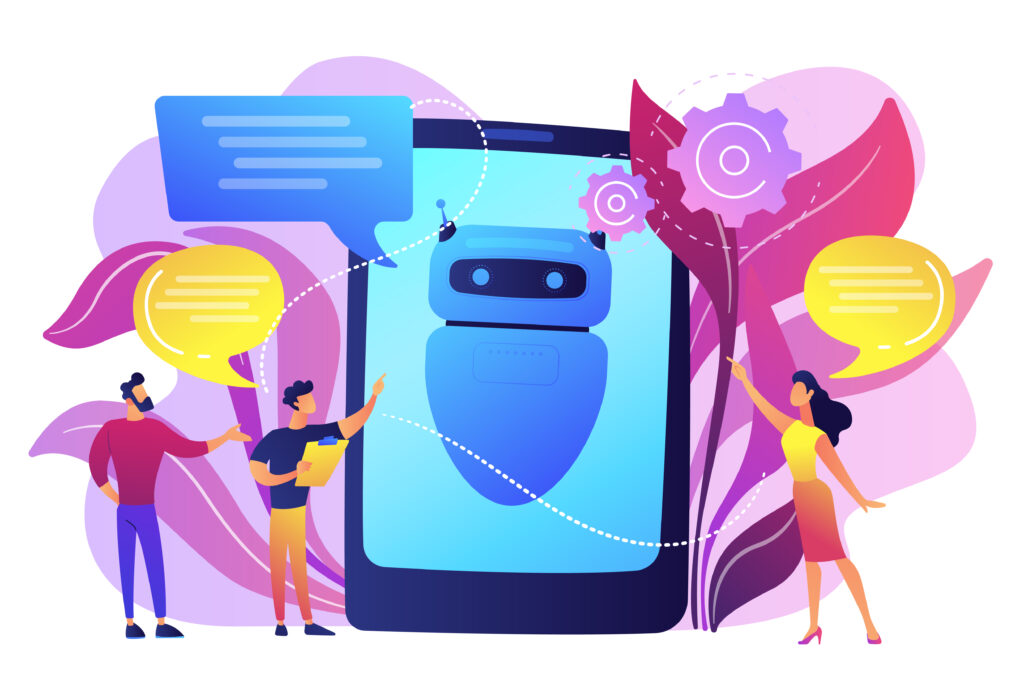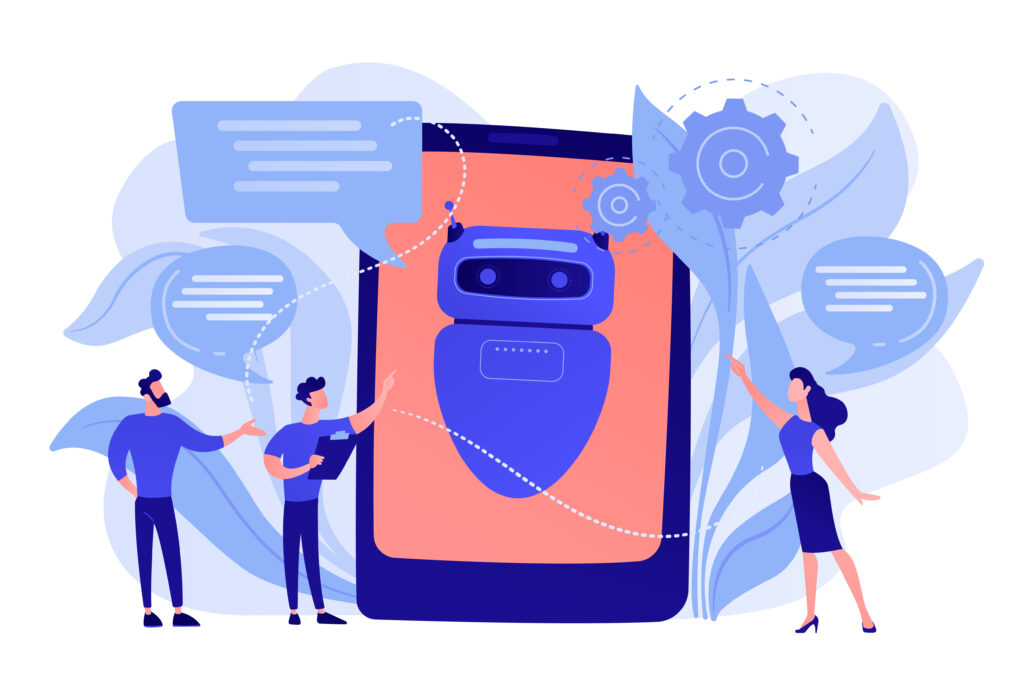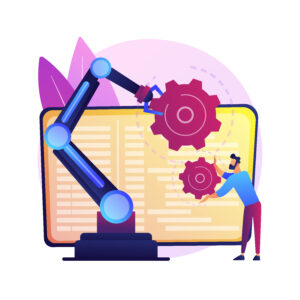What is AI for Customer Service Automation?
AI in customer service automation involves utilizing artificial intelligence technologies to streamline and improve customer interactions. This automation can manifest in various ways, such as through chatbots, virtual assistants, AI-powered analytics, and machine learning algorithms that assist businesses in comprehending and predicting customer requirements.

AI allows the automation of tasks like responding to frequently asked questions (FAQs), resolving common issues, guiding users through procedures, and offering tailored product suggestions.
Key Technologies Utilized
- Natural Language Processing (NLP): This technology allows machines to comprehend and respond to human language in both spoken and written forms.
- Machine Learning (ML): ML enables AI systems to learn from previous interactions, enhancing their capability to address future inquiries effectively.
- Voice Recognition: AI systems leverage voice recognition technologies to handle customer inquiries via phone or voice-activated platforms.
- Computer Vision: In more sophisticated systems, AI can analyze images or videos to assist with tasks such as visual troubleshooting or product identification.
Key Applications of AI in Customer Service Automation

AI-Powered Chat bots
Definition: AI chatbots are virtual assistants designed to manage basic customer inquiries, such as tracking orders, providing account details, or responding to frequently asked questions. They utilize Natural Language Processing (NLP) to engage in conversations that feel more human-like.
Capabilities:
- Deliver immediate responses to customer queries.
- Direct more complex issues to human agents.
- Interact with customers in real-time across websites, apps, or messaging platforms (e.g., Facebook Messenger, WhatsApp).
- Provide personalized replies based on user data and past interactions.
Voice Assistants
Definition: AI voice assistants, like Amazon’s Alexa or Google Assistant, employ voice recognition and NLP to communicate with users verbally.
Capabilities:
- Respond to customer inquiries via voice-enabled devices.
- Facilitate hands-free interactions in sectors such as automotive or retail.
- Handle service requests, including booking appointments or updating order statuses.
AI-Driven Ticketing System

Definition: These AI systems efficiently manage and route customer support tickets. By analyzing ticket content, they can categorize issues, assign priority levels, and direct them to the right department or agent.
Capabilities:
- Evaluate customer queries and assign them to the most suitable agent.
- Prioritize urgent matters over less critical ones.
- Provide agents with relevant customer history or suggest solutions to expedite issue resolution.
AI for Predictive Customer Support
Definition: This application utilizes predictive analytics powered by machine learning to foresee customer issues before they occur.
Capabilities:
- Examine historical data to identify patterns that may indicate potential problems.
- Issue proactive notifications to customers (e.g., alerts about upcoming product issues or renewals).
- Anticipate product failures or potential customer churn, allowing businesses to take preventive measures.
Sentiment Analysis and Emotional AI

Definition: AI can assess the sentiment and tone of customer interactions to gauge their emotional state.
Capabilities:
- Identify when a customer is frustrated, upset, or confused and escalate the issue as needed.
- Analyze social media posts, reviews, or emails to assess public sentiment towards a brand or product.
- Enable agents to adjust their tone and responses based on the customer’s emotional condition.
Benefits of AI for Customer Service Automation
- 24/7 Availability: AI-powered systems offer continuous customer service support, ensuring assistance is available at any time, regardless of time zones. This round-the-clock availability allows customers to receive help even outside regular business hours.
- Instant Response Times: AI systems can address simple inquiries instantly, eliminating the wait times typical of traditional support channels. This capability leads to faster resolutions and enhances overall customer satisfaction.
- Scalability: AI can manage thousands of customer interactions simultaneously, making it particularly suitable for businesses that experience high inquiry volumes. This scalability is especially advantageous during peak times, such as sales events or product launches.
- Cost Efficiency: By automating routine queries, AI reduces the reliance on large customer support teams, which can lower operational costs while still maintaining high service standards.
- Enhanced Personalization: AI systems can analyze customer data to deliver personalized responses and recommendations. For example, an AI chatbot might utilize a customer’s purchase history to suggest complementary products or tailored solutions.
- Reduced Human Error: AI-driven systems operate based on programmed logic and learning models, which minimizes errors in customer support. This ensures consistent responses and compliance with company policies.
- Improved Agent Productivity: By automating repetitive tasks, AI enables human agents to concentrate on more complex or sensitive issues. Additionally, AI can provide relevant information or suggest responses to agents, thereby increasing their efficiency.
Challenges of AI for Customer Service Automation
- Handling Complex Queries: While AI excels at managing simple and repetitive tasks, complex or nuanced issues still necessitate human intervention. A system that is overly rigid may struggle to comprehend unique or unexpected customer problems, resulting in customer frustration.
- Customer Frustration with Bots: Some customers prefer human interaction and may feel frustrated if AI systems are unable to escalate issues promptly or if bots provide generic responses that do not meet their specific needs.
- High Initial Investment: The implementation of AI-powered customer service solutions can be expensive, particularly for smaller businesses. Significant investment is required for technology, infrastructure, and ongoing maintenance.
- Data Privacy Concerns: AI systems typically require access to extensive customer data to operate effectively. Businesses must ensure compliance with data privacy regulations such as GDPR or CCPA to mitigate legal and reputational risks.
- Dependence on Data Quality: AI’s effectiveness hinges on the availability of accurate and comprehensive data. Poor data quality, incomplete customer profiles, or incorrect inputs can significantly undermine the performance of AI systems.
Best Practices for Implementing AI in Customer Service Automation

- Start with Specific Use Cases: Focus on automating straightforward, high-volume tasks such as FAQs and password resets before progressing to more complex implementations. This approach helps demonstrate the value of AI while minimizing risks.
- Ensure Seamless Handoff to Human Agents: Design AI systems to recognize when an issue is beyond their capabilities and escalate it efficiently to human agents. A smooth transition helps prevent customer frustration and ensures that intricate problems are resolved promptly.
- Continuously Train AI Systems: Regularly update AI models with new data to enhance their accuracy and ability to address changing customer needs. Ongoing training allows AI to learn from previous interactions and improve over time.
- Focus on Personalization: Utilize AI to create personalized customer experiences by analyzing past interactions, preferences, and behaviors. Personalization fosters increased customer satisfaction and loyalty by making each interaction relevant and meaningful.
- Monitor Performance and Gather Feedback: Consistently track AI performance metrics, such as customer satisfaction scores, resolution times, and bot abandonment rates. Additionally, collect customer feedback to identify areas where AI excels or falls short, enabling adjustments to strategies as needed.
- Maintain Data Privacy and Security: Ensure that your AI systems comply with all relevant data protection laws and prioritize the security of customer data. Being transparent about how customer data is utilized builds trust and reassures customers that their information is safe.
[Want to learn more about AI for Customer Service Automation? Click here to reach us.]
Conclusion
In conclusion, the integration of AI into customer service automation is revolutionizing how businesses engage with customers. By utilizing technologies like chatbots, voice assistants, and predictive analytics, organizations can enhance efficiency and provide personalized experiences. While the benefits are substantial—such as 24/7 availability and cost savings—challenges like managing complex queries and ensuring data privacy must be addressed.




0 Comments